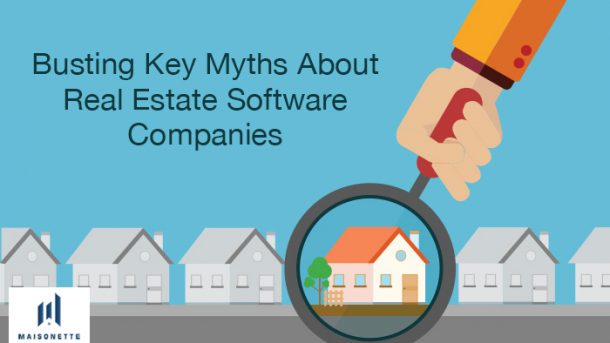Think about how Airbnb, the recognized bread and breakfast aggregator is similar to Uber: it lists millions of properties although it owns none of them. That’s because it signifies an evolving real estate market that is aiming to become nimble, customer-focused and reflects shifting interest in people’s habits and lifestyles. Let’s move gears a bit and talk about real estate software companies. Through a gamut of them serving the market, they have upended the market and have leveraged it as their clients have been able to become more efficient and help clients better. However, some vendors with inadequate or irrelevant strategies, have led to a few myths being raised around their functioning and benefit.
Our purpose is to dispel those myths through a combination of facts proven by what commercial real estate management software has achieved over the past few years, what experts have been claiming and now forecast the future of this industry, and our personal experience working with leading clients across the world
Cloud Systems’ Usability Is A Bit ‘Cloudy’
There is always this element of doubt when it comes to software replacing traditional, paper-based or desktop applications that were considered the mainstay of real estate operations. Not anymore. If you think the ‘cloud’ is a mysterious place where wizardry and magic happen to other firms and not certainly to yours, that’s the biggest myth we wish to bust. Improving digitisation across related sectors, improving internet and computing capabilities have given real estate software companies the potential to develop cutting-edge solutions. These can serve your unique business requirements, with an easy-to-understand interface, and interesting solutions that help you discover new possibilities to pursue.
Current Property Management Softwares are all powered by the cloud, meaning it’s time to slowly move away from that desktop application you’ve been sold some time back, as it is prone to the following problems:
Not being on the cloud means you don’t get to stay updated wherever you are. That means your software is a liability to business performance
An inadequate security update schedule puts your software at prone to security flaws that your competitors can leverage, or expose your business to unintended parties
Issues integrating with newer apps and features that are increasingly cloud-based
CRM/ERP Tools Usually Cost A-Bomb
While the cost of both traditional and cloud management software might have been higher in the past, an increasing number of players and the sheer drop in the value of computing power, internet connectivity combined with the economies of scale seen in the real estate software industry have all led to a rationalisation of prices.
Further, software offered by traditional companies might give you benefits in the short-term, like an affordable entry cost of installation and licensing fees. But the values in the long run, like security patches, data storage, backup and crash prevention insurance all quickly add up to unreasonable costs, if you look at the overall expenditure over a few years. Comparatively, consider the pricing of current offerings by Real Estate Software Companies powered by cloud computing, advanced analytics and artificial intelligence capabilities. You will notice that both your entry and operational costs are significantly lower, and you get direct benefits as well as indirect benefits (think on-the-go client data analysis capabilities, custom report tracking etc.). In fact, a study shows how real estate CRM offerings deliver a return of $5.60 for every dollar spent. Now that should make you sit up and consider opting for one.
My Business Could be Exposed to Software Threats
Broad-scale hacks and cybersecurity nightmares might fill the news periodically, and it is always good to be cautious than carefree. But the fact is the number of threats received and resolved is minuscule to what you hear on the news. Or from hearsay, for that matter. In fact, our experience shows traditional software is more prone to both security attacks and loss of hardware performance (or loss of hardware itself). Laptops are stolen, hard disks are lost or get corrupted, or legacy software is hacked, owing to their limited security infrastructure and reduced update cycles. Comparatively, Real Estate Software Companies come with security levels that not just meet the threshold of security protocols for enterprises like yours but far surpass it. Multiple reports that surveyed both clients and vendors showed the consideration for ensuring maximum security is high among their feature parameters. Cloud solutions by Real Estate Software Companies come with advanced authentication gateways, multiple firewalls to thwart attacks, and even advanced features like identifying unknown logins or the possibility to block access remotely.
The ‘un-ease’ of Integration & Time Drag
Since the real-estate business is a diverse set of vendors, partners, brokers and more, it can only be natural that the word in the street hovers around apprehension on bringing different software structures of these stakeholders together. And that’s where commercial real estate management software brings out its potential. The cloud systems, synonymous with the real cloud, are inherently designed to work with other cloud and even legacy systems, through adaptable interfaces and connectors like the application programming interface. This widens the aperture for enormous possibilities to move your operations from legacy to cutting-edge solutions, where you can plug the power of advanced big data analytics and machine learning to go through tomes of data. You also get the ability to connect internal functions like asset management, project and lease management, with existing management tools for sales and order management, all connected and integrated like a well-oiled machine. Real Estate Software Companies are reducing the time-to-market for software builds because solutions are now being increasingly created based on a model architecture, supported by advanced coding capabilities that automatically write your software.
The real estate software market globally is on a growth curve of 12.1%, expected to reach USD 8.91 by 2021, on the back on rapid adoption of these solutions, and growing customization to suit customer’s requirements. Our data shows how most of our clients need specific answers that are preferred to be turnkey in nature. Coupled with real estate software companies driving innovation through their solutions, the increasing demand of enterprise applications, project management solutions and the need for universality of access and security all show how the myths explained are being busted, one day at a time.


No Comments, Be The First!